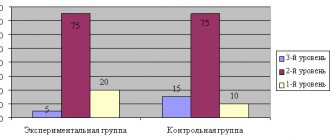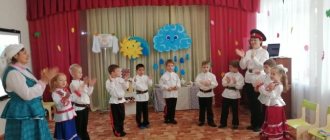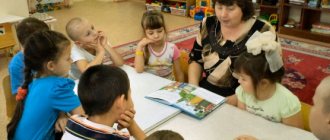Patriotic education of preschool children through fiction
Domareva Irina Nikolaevna head Petrovskaya Albina Valentinovna senior teacher Kochkina Tamara Ivanovna Sidelnikova Tatyana Anatolyevna educators MBDOU DS No. 61 “Semitsvetik” Stary Oskol city district
Patriotic education of children is one of the main tasks of a preschool institution. The feeling of patriotism is multifaceted in content. This includes love for one’s native places, pride in one’s people, a sense of one’s inseparability with the outside world, and a desire to preserve and increase the wealth of one’s country.
Patriotic education of a child is a complex pedagogical process. It is based on the development of moral feelings. A child’s sense of homeland begins with his relationship to his family, to those closest to him: mother, father, grandmother, grandfather. The feeling of the Motherland begins with admiration for what the baby sees in front of him, what he rejoices at and what evokes a response in his soul. And although many impressions have not yet been deeply realized by him, when passed through childhood perception, they play a huge role in the formation of the personality of a patriot.
In older preschool age, children become more and more familiar with books as a source of information about the world. The book - as a symbol of knowledge, joy, pleasure - is familiar to students from early childhood. But it is precisely in older preschool age that she becomes an integral companion in instilling in children a love for their fatherland.
Books containing proverbs, sayings, fairy tales, etc. are of constant interest to preschoolers. Oral folk art is the richest material for patriotic education. Russian folk fairy tales, full of wonderful fiction, dramatic situations, confrontation between good and evil, not only entertain and delight children, but also lay the foundations of morality.
A special ancient genre of oral folk art, with which we introduce pupils in senior preschool age, are epics. The content of epics is rich in examples for patriotic education. (After reading epics, children show great interest in Russian heroes: they look at illustrations, reproductions of paintings, draw heroes, sculpt them from plasticine, imitate them in games).
Advertising message
In addition to folk heroes, pupils are aroused by stories about various professions, especially those with which they were not yet familiar in their everyday lives - polar explorers, travelers, scientists, military men, firefighters, astronauts. Knowledge about various opportunities to show their courage and heroism in everyday life inspires preschoolers, instills in them the desire to master a “heroic” profession, to serve people and the Fatherland. Preschoolers are born with the desire to be pilots, astronauts, and military personnel.
Poems about the Great Patriotic War are one of the most important components of patriotic education. Poems by S. Mikhalkov, S. Vasiliev, A. Tvardovsky, A. Barto about the exploits and courage of soldiers and partisans who defended the Motherland and who did not spare themselves in the struggle are a highly artistic means of influencing the consciousness of a child.
Stories about the Great Patriotic War, about children and teenagers who participated in the fight against the invaders, introduce modern children to the exploits of their great-grandparents. Children empathize with the characters of A. Gaidar, L. Kassil, A. Mityaev, are worried, for the first time realize the cruelty and mercilessness of war, are indignant against fascism, attacks on civilians, and receive the first knowledge about the equality of all races and nationalities.
Stories about the hometown of Stary Oskol are a separate type of special children's literature for the patriotic education of preschoolers. The poems used here are by L. Pichinevka “The most beautiful city of Stary Oskol”, E. Syrovatskaya “Stary Oskol”, B. Shamraev “Stary Oskol. Hymn to the city”, etc. As a rule, such books are brightly illustrated and contain material suitable for children's perception.
The main form of using literature in instilling patriotism in older preschoolers is a specially organized lesson. As part of their familiarization with the surrounding world, nature, and literature, preschoolers listen to various works, talk with the teacher, tell their impressions, memorize and retell.
In addition to direct educational activities, literary works are given to preschoolers in many other forms. Children very readily perceive stories played out using tabletop and glove theaters. Based on familiar fairy tales and stories, it is necessary to organize dramatizations - performances, dramatizations based on well-known (or just read) works. By experiencing the plot from the first person, the child understands more deeply the motives of the character’s actions and absorbs the ways of behavior.
The educational power of fiction is aimed at forming in preschoolers the image of a hero, a defender of their state, cultivating a sense of pride in the history of the country’s formation and the need to defend the Motherland, developing a desire to be a defender of the land on which he was born and raised, which was cherished by his ancestors like the apple of his eye. Examples of heroic deeds of the main characters of literary works contribute to the understanding that all great deeds and courageous deeds are performed out of love for the Fatherland and their loved ones, for their people, out of a sense of responsibility towards them.
To consolidate the impressions of what they read, as well as to monitor children’s assimilation of the material, students are given the opportunity to creatively express impressions through art activities, design, and modeling. The teacher can organize free dramatization, construction or role-playing games with preschoolers. The interest of the pupils or the productivity of their activities shows how interesting the work of art was for the children, how accessible and convincing the teacher conveyed the feelings and events expressed in it, how much the image of a national hero, a responsible citizen is formed in preschoolers, how close and understandable to them are the phenomena of their native culture, plots of fairy tales, works of art in general. The tasks of patriotic education are solved comprehensively, but fiction occupies one of the main places in the formation of the personality of a young citizen of our Motherland.
Bibliography:
- Raising children in the traditions of folk culture / Vataman V.P., Volgograd, 2008.
- Raising children in the traditions of Russian culture / Lunina G.V., – M., 2005.
- For preschoolers about defenders of the fatherland / Under. ed. Kondrykinskaya L.A. – M., 2006.
- Spiritual and moral education through the means of author’s fairy tales / Korotkova L. D., – M., 2006.
- Play activities in kindergarten / Gubanova N. F., M., – 2006.
- How to teach children to love their homeland / Antonov Yu. E., Levina L. V., Rozova O. V. et al. - M., 2005.
- Patriotic education of children 4 – 6 years old / Komratova N. G., Gribova L. F., – M., 2007.
- Patriotic education of preschool children / Aleshina N.V. - M., 2008.
- Introducing children to fiction / Gerbova V.V., M., – 2006.
- Education and training program in kindergarten / Ed. Vasilyeva M. A., Gerbova V. V., Komarova T. S. - M., 2004.
Attention! Promotion until January 14!
Author: Fedenko Tatyana Petrovna
“Literature lessons as a means of patriotic education”
annotation
Patriotism is one of the most significant, enduring values inherent in all spheres of life of society and the state, is the most important spiritual asset of an individual, characterizes the highest level of its development and is manifested in its active self-realization for the benefit of the Fatherland.
Fiction has great potential in the patriotic education of the younger generation.
Key words: literature, education, Motherland, patriotism.
The idea of patriotism has at all times occupied a special place not only in the spiritual life of society, but also in all important spheres of its activity - ideological, political, economic, cultural. Noble feelings are not born by themselves, do not arise spontaneously, but are formed, developed and improved in the process of education and the acquisition of life experience, starting from childhood. In this regard, the problem of patriotic education has been and remains one of the pressing problems.
The main goal of civic and patriotic education is to orient the younger generation towards the values of national culture, to form in them a value-based attitude towards the Motherland, its cultural and historical past. It is important to instill in children a sense of pride in their country, to instill in them respect for the Constitution, state symbols, native language, folk traditions, history, culture, and nature of their country; to form an active civic position and self-awareness of a citizen of the Russian Federation.
Humanities education has special potential in the spiritual and moral education of the individual, the development of his moral qualities, civic consciousness, communication abilities, emotional and value-based attitude to the world around him, and aesthetic culture. The subjects of this cycle provide schoolchildren with examples of moral behavior, spiritual culture of the individual, and expand the positive social experience of children and adolescents.
The main task of patriotic education in literature lessons is the process of becoming a Human in every child. But this process is very complex, and its result largely depends on the skill of both the teacher and the parents.
The task of a literature teacher is to create, in the process of analyzing works, such an image of a hero, such educational situations when teenagers would engage in thinking about the meaning of a person’s existence in society, about his responsibility for his behavior.
One of the main directions of patriotic education is to instill love for the Motherland, native land, and a sense of pride in one’s Motherland. Without love for the Motherland and respect for its history and culture, it is impossible to raise a citizen and patriot. To achieve these goals, literature lessons have rich opportunities through the study of the programmatic works of A.S. Pushkina, M.Yu. Lermontova, N.A. Nekrasova, L.N. Tolstoy, A. Akhmatova, M. Tsvetaeva, M.A. Bulgakova, A.I. Kuprin and others.
V. Sukhomlinsky wrote: “It is impossible to awaken the feeling of the Motherland without perceiving and experiencing the surrounding world. Let the memories of a small corner of distant childhood remain in the child’s heart for the rest of his life. Let the image of the great Motherland be associated with this corner.”
Literature lessons are advantageous in that they encourage an excited conversation about the difficult problems of our life, about the difficult fate of the heroes of works, about lack of spirituality, about the loss of moral ideals, about good and evil, even about the role of the family in the upbringing of a person.
Already in the fifth grade, when getting acquainted with works of oral folk art, there is a detailed conversation about hard work, honesty, truthfulness, courage, steadfastness in defending the Motherland, patriotism; cowardice, cowardice, selfishness, laziness, and idleness are condemned.
In literature for middle grades there are a lot of works that educate children to be compassionate, responsive and humane: F.M. Dostoevsky “The Boy at Christ’s Christmas Tree”, V.V. Mayakovsky “Good attitude towards horses”, I.S. Kuprin “White Poodle”, “Bite” by L. Andreev, “What Horses Cry About” by F. Abramov. etc. By talking over works, discussing the actions of heroes, children learn to understand the world, to distinguish lies from truth, good from evil, beautiful from ugly.
In the senior grade, the main attention of schoolchildren when analyzing Russian classics is aimed at the unique ways of depicting the human personality in fiction of different directions. For example, N.S. Leskov “The Enchanted Wanderer,” a novel in verse by A.S. Pushkin’s “Eugene Onegin” - the ideals of human dignity, civil service to the motherland, the works of M. Yu. Lermontov “Farewell, unwashed Russia”, “Motherland” - the sublime and tragic in poetry; novel by F.M. Dostoevsky’s “Crime and Punishment” - an uncompromising search for truth, pain for a person as the basis of the author’s position, the problem of a person’s personal responsibility for the fate of the world, the novel by L.N. Tolstoy’s “War and Peace” - love of life, a sense of the fullness of being, the search for the meaning of life - this is an incomplete list of works that play an important role in the spiritual maturation of a person and provide answers to many of our questions.
In the fiction of the 20th century we find reflection of all aspects of the Russian national character. We see the heroic-patriotic active creativity inherent in the national characteristics of our people in the works of A. Tvardovsky, M. Sholokhov, A. Platonov, V. Grossman and many other writers.
A large section of 20th-century literature is devoted to works about the Great Patriotic War.
Works about Man at War, the truth about him, cruel realities and romance in the description of war provide rich material for instilling patriotic feelings in students and forming their civic position.
Using the example of the greatness of a national feat, literature instills in a generation that has not known war, respect for its Motherland, for the victorious people.
Perhaps modern teenagers are not interested in everything, not everything is clear about the past. But you must admit: without the past there is no future. And everyone thinks about the future. So what kind of future do we dream of for our children? Undoubtedly, a worthy one. Russian classical literature is time-tested literature, and it exists not for pleasure, but for experience.
It is always easier to know, understand and feel a person, an event through art. The formation of patriotic feelings is facilitated by performing creative tasks in lessons: drawing an illustration for a historical event, making crosswords, voicing dialogue between historical figures, writing a script for a film, oral drawing.
The use of musical fragments and theatrical elements allows you to create a special emotional mood in the lesson, which will largely determine its success.
The use of ICT technologies is the result of the formation of a more effective teaching model - this is a requirement of the time, allowing to diversify the lesson and intensify the work of students. The success of teaching depends on the creative personality of the teacher, on his ability to use ICT, aimed at the formation and development of the information culture of students.
Effective use of the latest pedagogical technologies, educational capabilities of forms and methods of teaching ensures the education and development of the personality of schoolchildren, contributes to the manifestation of their own moral and civic position, and participation in patriotic activities.
“They learn words, but they captivate with examples”
Literature lessons are designed to form an aesthetic attitude towards the world around us. Together with history and social science, literature addresses problems directly related to the social essence of man, forms historicism in thinking, enriches the cultural and historical memory of students, and forms an active attitude towards reality, towards nature, and towards the entire world around us.
Fostering patriotism is tireless work to create in schoolchildren a sense of pride in their Motherland and their people, respect for its great achievements and worthy pages of the past, and the importance of literature lessons in this regard cannot be overestimated.
References:
1. Yzerman L. Topic “None of my fault?”: What are the values
are formed in literature lessons // Teacher. gas. — 1997
2. Patriotic education in literature lessons and extracurricular activities
work. Ed. M.A. - M.: Education, 1985
3. System of work on the study of modern literature at 8-10
classes. Moscow "Enlightenment", 1985
4. Gasanov, Z.T. Purpose, objectives and principles of patriotic education
citizens [Text] / Z.T. Hasanov // Pedagogy. – 2005 – No. 6. – pp. 59-63
5. Ovchinnikova N.P. The idea of patriotism and Fatherland in Russian history
pedagogy [Text] / N.P. Ovchinnikova // Pedagogy. – 2007 – No. 1 – P. 93


